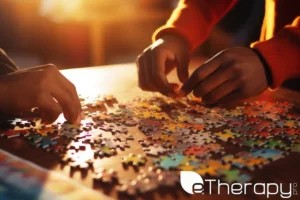Daddy issues – a term colloquially used, often pejoratively, that captures a complex array of emotions, behaviors, and challenges stemming from an individual’s relationship with their father. While it’s a term frequently bandied about in popular culture, the psychological implications are significant and far-reaching. Addressing such issues isn’t about casting blame on parents, but about understanding the profound impact early parental relationships can have on our emotional health and interpersonal relationships. Let’s delve into what daddy issues really mean, its origins, the impact it has, and importantly, how it can be recognized and addressed.
Defining daddy issues
Daddy issues is a term that originates from psychoanalytic theories and is commonly used in popular culture. Despite its frequent use, understanding its full scope is crucial to addressing it effectively.

Also known as a “father complex” or “dad complex,” daddy issues are a psychological concept that encompasses the emotional and psychological challenges individuals may experience due to their relationship with their fathers or father figures.
The term “father complex” was first introduced by renowned Swiss psychiatrist Carl Jung, who explored the intricate dynamics between father figures and individuals’ psyche. Jung described the father complex as a profound influence on one’s behavior, beliefs, and emotional well-being. Reflecting on this concept, Jung astutely observed,
Until you make the unconscious conscious, it will direct your life, and you will call it fate. – Carl Jung
Psychological Implications
Daddy issues can encompass a wide range of psychological implications. Fundamentally, they are connected to an individual’s relationship with their father, and particularly to situations where this relationship was absent, inconsistent, or fraught with conflict. This often translates into deep-seated insecurity and emotional instability.
1. Impact on Emotional Health
Emotional health is profoundly impacted by the presence of a dad complex. The recurring feelings of insecurity can lead to chronic anxiety, difficulty regulating emotions, and a pattern of unstable relationships. They can also manifest as an internalized belief of not being good enough, resulting in low self-esteem.
2. Coping Mechanisms
Individuals with daddy issues often develop maladaptive coping mechanisms as a way to deal with their unresolved emotions and experiences. This can include behaviors like excessive self-reliance, where they avoid relying on others for fear of being let down, or the opposite, where they seek constant reassurance from others to counteract deep-seated feelings of unworthiness. Both scenarios can contribute to strained relationships and perpetuate the emotional turmoil they are trying to escape.
3. Impact on Future Relationships
Daddy issues can significantly impact an individual’s ability to form and maintain healthy relationships in the future. An underlying fear of abandonment, rejection, or disapproval can make it difficult to trust others, leading to patterns of self-sabotage, or the development of unhealthy attachments. This often results in a cycle of unfulfilling relationships that reinforce negative self-beliefs.
Common Misconceptions
The relationship between father and child is sacred and deeply influential. It shapes the way we perceive ourselves and the world around us. – Dr. Shefali Tsabary
It’s a fitting quote to illustrate the severity of a dad complex, a term often diminished or misunderstood. There are many misconceptions associated with it, largely fueled by stereotypes and stigma.
1. Stereotyping and Stigma
Father issues are often trivialized or turned into a punchline, but the reality is far more nuanced. It’s not restricted to any gender, and it doesn’t automatically lead to dysfunctional romantic relationships, as often depicted. Such stereotypes contribute to the stigma, making it harder for those struggling to seek help and understanding. Understanding the genuine complexity of daddy issues is the first step towards addressing them.
2. Misinterpretation of Behavior
Another common misconception is that certain behaviors, especially in the context of relationships, are the direct result of daddy issues. While it’s true that these issues can influence behavioral patterns, it’s overly simplistic and potentially harmful to attribute all behavioral concerns to them. Humans are complex, and behavior is influenced by a myriad of factors, including personal experiences, environment, and individual personality traits. Oversimplifying the impact of father issues can prevent a comprehensive understanding and addressing of one’s emotional health.
3. Misplacement of Blame
A major misconception is the tendency to place blame solely on fathers for the development of a dad complex. While the paternal relationship is undeniably significant, it’s important to recognize that parental roles are influenced by a wide range of societal, familial, and individual factors. Moreover, many fathers may also be dealing with their own unresolved issues and traumas. Assigning blame doesn’t contribute to healing but understanding the wider context can be a crucial step towards resolution and growth.
Origins of Dad Issues
Understanding daddy issues requires a deep dive into the roots of the problem. While individual experiences vary, these issues often stem from the dynamics of the father-child relationship and other contributing factors.
The Father-Child Relationship
The father-child relationship is a crucial aspect of a child’s development and can have significant implications for their emotional and psychological well-being. This relationship often acts as the first model for interpersonal relationships outside the family, thereby shaping the child’s perception of how relationships function.
Role of Fathers
Fathers, like mothers, play a significant role in the emotional, psychological, and social development of their children. They contribute to shaping their child’s worldview, self-esteem, and relationships. When the father-child relationship is healthy, it often leads to a balanced emotional development. However, when it’s strained, it can result in emotional challenges, including daddy issues. For those trying to navigate this complex relationship, eTherapyPro can provide valuable guidance and support.
The Absence of a Father Figure
An absent father can leave a significant void in a child’s life. This absence can be physical, with the father being entirely or partially missing from the child’s life, or emotional, with the father being physically present but emotionally distant. This absence often leads to feelings of neglect and abandonment, potentially contributing to the development of father issues.
Factors Contributing to a Dad Complex
While the father-child relationship is central to the development of daddy issues, several other factors can contribute to this complex phenomenon.
These include:
- Neglect or Abandonment: A child who experiences neglect or abandonment by their father can develop feelings of rejection, negatively impacting their self-worth and emotional stability.
- Abuse or Trauma: Experiencing abuse (physical, emotional, or sexual) or significant trauma related to their father can lead to serious emotional and psychological distress.
- Unresolved Conflict: Prolonged and unresolved conflicts between a child and their father can create emotional tension and foster resentment, contributing to daddy issues.
- Inconsistent Parenting: Inconsistencies in the father’s parenting style, such as fluctuating between being overly strict and excessively lenient, can cause confusion and insecurity in a child.
- Unfulfilled Emotional Needs: If a father is unable or unwilling to fulfill a child’s emotional needs, the child may feel unloved or unwanted, leading to self-esteem issues and potential daddy issues.

Understanding these contributing factors can be the first step in addressing a dad complex and seeking professional help. It’s crucial to remember that it’s possible to navigate these challenges and achieve emotional well-being with the right support and resources.
Impact of Daddy Issues
When unresolved, dad issues can manifest in various ways and significantly affect an individual’s life. The impact often extends beyond the individual’s perception of their father, influencing their self-identity, relationships, and overall emotional health.
Personal Relationships
Our early experiences with our parents set the foundation for how we approach relationships later in life. Unresolved daddy issues can disrupt this foundation, leading to challenges in forming and maintaining healthy relationships.
Trust Issues
One of the most common ways daddy issues affect relationships is through the development of trust issues. Individuals may find it hard to trust their partners, often leading to insecurity and jealousy. They may constantly worry about abandonment or rejection, reinforcing a cycle of fear and anxiety in their relationships.
Communication Barriers
Another potential impact of daddy issues on personal relationships is the development of communication barriers. Difficulty expressing feelings or understanding the feelings of others can stem from a disrupted father-child relationship. These communication issues can cause misunderstandings and conflict in personal relationships, further complicating the individual’s emotional landscape.
Recognizing Dad Issues in a Partner
Recognizing the presence of daddy issues in a partner can be a challenging task. These deep-seated emotional issues can manifest in various ways and vary in intensity from person to person. It requires a keen understanding of the underlying dynamics and behaviors that may stem from these issues. The impact of a father complex on an individual’s relationships and emotional well-being can be complex, making it essential to approach the topic with empathy, open communication, and a willingness to support each other on the journey of healing and growth.
Self-Esteem and Identity
A man cannot be comfortable without his own approval. – Mark Twain
This quote underscores the importance of self-esteem in our lives. A dad complex can profoundly affect a person’s self-esteem and overall identity.
Self-Perception
Daddy issues often result in a distorted self-perception. Individuals might see themselves through a lens tainted by their father’s neglect or mistreatment, leading to low self-esteem and a negative self-concept. eTherapyPro’s therapists can aid in improving self-perception and dealing with daddy issues, helping individuals develop a healthier and more accurate view of themselves.
Imposter Syndrome
Another way daddy issues can impact self-esteem and identity is through the manifestation of Imposter Syndrome. Individuals may feel they are not deserving of success or happiness, regardless of their accomplishments. They may constantly fear being exposed as a “fraud”, leading to increased stress and anxiety. Therapists at eTherapyPro can provide guidance and strategies to help individuals overcome these debilitating perceptions and build a stronger sense of self-worth.

Recognizing daddy issues
Recognizing the presence of dad issues can be challenging. These issues often present themselves in subtle ways, blending into a person’s behavior, personality traits, and relationship patterns. However, understanding these signs is a crucial step towards addressing the underlying problems and initiating healing.
Signs and Symptoms
Daddy Issues can manifest in various ways and can differ greatly from person to person, depending on their individual experiences and circumstances. However, there are common signs and symptoms that can indicate the presence of these issues. Awareness of these indicators can serve as the first step towards understanding and addressing these deeply ingrained emotional challenges:
- Fear of Abandonment: An intense and irrational fear of being abandoned by loved ones, particularly in romantic relationships, often leading to clingy or overly dependent behavior.
- Unhealthy Attachment Patterns: These can include both being excessively clingy or avoidant and distant in relationships, creating an imbalance and tension between partners.
- Dependence on Validation: A constant need for approval and validation from others, often to the extent of linking self-worth with external opinions and appraisal.
- Emotional Instability: Experiencing extreme mood swings, difficulty in regulating emotions, or a tendency to overreact to minor incidents.
- Trust Issues: Difficulty in trusting others, particularly romantic partners, stemming from the fear of being hurt or betrayed.
- Difficulty in Forming Lasting Relationships: A history of unstable or short-lived relationships due to an inability to form secure and trusting bonds with partners.
- Attraction to Unavailable or Damaging Partners: A tendency to be drawn towards emotionally unavailable or harmful partners, recreating the dysfunctional dynamic of the early father-child relationship.
- Low Self-Esteem: A pervasive feeling of worthlessness or being undeserving of love and respect, leading to self-sabotaging behaviors.
- Unresolved Anger or Resentment: Holding onto unaddressed feelings of anger or resentment towards the father figure, often projecting these feelings onto other relationships.
- Difficulty Expressing Emotions: Struggling to express feelings or needs effectively due to fear of rejection or criticism.
These signs and symptoms are not exhaustive and can occur in various combinations and intensities. It’s important to remember that they indicate possible challenges but are not definitive proof of dad issues. Professional help should be sought if these issues persistently interfere with personal well-being and the quality of relationships.
Variations of Symptoms
It’s important to remember that symptoms of father issues can vary widely from person to person, influenced by various factors such as their personal resilience, the presence of other supportive figures during childhood, and their individual personality traits.
Dependence on Validation
One way that dad issues may manifest is an excessive dependence on external validation. Individuals may constantly seek approval from others, often linking their self-worth to the opinions of those around them. This is a reflection of their need for validation that was unfulfilled during their formative years.
Emotional Instability
Emotional instability can also be a symptom of a dad complex. Individuals may experience mood swings, difficulty regulating their emotions, or a tendency to overreact to minor incidents. This instability often stems from the emotional turmoil caused by a dysfunctional father-child relationship.
Addressing Daddy Issues
One of the crucial steps in dealing with dad issues involves acknowledging their existence and understanding their impact on your life. Overcoming these deeply ingrained issues often requires professional guidance, and at times, therapeutic interventions.
Professional Guidance
Dealing with daddy issues is not a journey that one needs to embark on alone. Psychologists, therapists, and other mental health professionals can provide valuable insights and offer effective strategies to navigate these complex emotional landscapes. Notably, eTherapyPro provides access to professionals who can help guide you through this journey, offering understanding, empathy, and actionable advice.
Therapeutic Approaches
Therapy plays a pivotal role in addressing and eventually overcoming daddy issues. There are several therapeutic methods that can prove beneficial, depending on the individual’s unique circumstances and needs.
As beautifully stated by eminent psychologist Carl Rogers, The good life is a process, not a state of being. It is a direction, not a destination.
Here are some common therapeutic approaches used to address daddy issues:
Cognitive-Behavioral Therapy (CBT): CBT focuses on identifying and changing harmful thought patterns, resulting in more positive behavior and emotional regulation.
Psychodynamic Therapy: This approach delves into past experiences and unconscious thought processes to better understand current behaviors and feelings.
Group Therapy: Sharing experiences and coping strategies within a group can offer both support and a sense of community.
Family Therapy: Involving the entire family can provide an understanding of family dynamics and how they might contribute to the issues at hand.
Each of these methods has its strengths, and a mental health professional can help determine the best approach for each individual situation. The most important thing to remember is that help is available, and taking that first step toward seeking it can be a significant stride toward healing.
Overcoming Daddy Issues
Successfully overcoming a dad complex is a journey, often requiring time, patience, and a lot of perseverance. It’s important to remember that healing is not a linear process, but with consistent effort and support, triumph is attainable.
The Role of Perseverance
Perseverance plays a significant role in the process of overcoming father issues. It can be challenging, and there may be times when progress feels slow or even nonexistent. However, persisting through these tough times is often what leads to breakthroughs. Overcoming a father complex is not a sprint but a marathon that requires dedication and resilience. Success stories from eTherapyPro indicate how therapy and persistence can create lasting change.
The Power of Persistence
No matter the difficulties encountered on this journey, the power of persistence should not be underestimated. Each step taken, no matter how small, contributes to overall progress and recovery. Success doesn’t come overnight; it’s the cumulative effect of all these small steps taken consistently over time.
Moving Forward
It’s critical to remember that a father complex does not define a person’s worth or potential. Instead, they represent past experiences that have shaped current behaviors and feelings. Once the healing process begins, it’s crucial to focus on moving forward and creating a healthier future.
As noted by psychologist Dr. Wayne Dyer, If you change the way you look at things, the things you look at change.
Building Healthier Relationships
Addressing a father complex often has a positive ripple effect on personal relationships. Healing from these issues can lead to healthier relationship patterns, improved communication, and increased trust in others. It’s also common to experience enhanced self-understanding and empathy, which are valuable tools for building stronger, more fulfilling relationships.
Embracing Self-Growth
Overcoming a father’s issues can also lead to significant personal growth. It’s an opportunity to reassess personal beliefs, behaviors, and patterns, leading to a deeper understanding of oneself. This journey can foster self-compassion, enhance resilience, and promote emotional maturity, all of which contribute to an overall sense of well-being.
In the journey of overcoming daddy issues, remember that progress might be slow and filled with setbacks. However, every step taken towards healing is a step in the right direction. Overcoming daddy issues is not just about healing past wounds; it’s about paving the way for a healthier, happier future.
Conclusion of Daddy issues
In conclusion, understanding and addressing daddy issues is a significant step towards healing and personal growth. These complex emotional challenges can have a profound impact on individuals, affecting their emotional well-being, personal relationships, and self-perception. By recognizing the existence of these issues and seeking the necessary support, individuals can embark on a transformative journey of healing and self-discovery.
It is crucial to dispel common misconceptions and stereotypes surrounding daddy issues and acknowledge the psychological implications they can have on emotional stability. The influence of the father-child relationship and the key factors contributing to the development of these issues shed light on their origins and provide insights into the importance of addressing them.
The impact of daddy issues on personal relationships, trust, self-esteem, and identity cannot be underestimated. Through professional guidance and therapy, individuals can gain valuable insights, develop effective coping strategies, and work towards healing their emotional wounds. Seeking the support of mental health professionals, such as those available at eTherapyPro, can provide the understanding, empathy, and actionable advice necessary for navigating the journey of overcoming daddy issues.
Various therapeutic approaches, including Cognitive-Behavioral Therapy (CBT), Psychodynamic Therapy, group therapy, and family therapy, offer valuable tools to address and heal these deep-seated issues. Each method recognizes the unique circumstances and needs of individuals, providing tailored approaches to support their healing process.
Overcoming daddy issues requires perseverance and a commitment to personal growth. It is a journey of self-reflection, introspection, and building healthier relationships. Through therapy and persistence, individuals can achieve success in their healing process, creating positive changes that extend beyond their initial struggles.
Moving forward from past challenges is possible, and it begins with shifting perspectives, embracing self-growth, and implementing strategies to lead a healthier life. By building healthier relationships, enhancing communication, and developing self-compassion, individuals can forge a brighter future.
In the journey of addressing a father complex, it is essential to remember that progress may not always be linear, and setbacks may occur. However, every step taken towards healing is significant. The key is to stay committed, persevere through difficulties, and embrace the support available.
It is with this understanding that eTherapyPro stands as a supportive partner in this journey towards healing and self-discovery. We encourage anyone struggling with daddy issues to take that courageous step towards seeking professional help. You deserve to live a life free from the constraints of unresolved emotional wounds, and with the right support, you can unlock a future filled with strength, resilience, and newfound hope.









